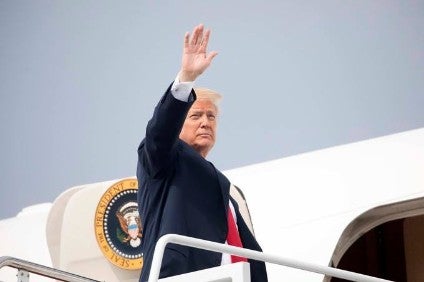
The US government has outlined what it would expect to achieve from a post-Brexit trade deal with the UK.
In its Summary of Specific Negotiating Objectives, the US Trade Representative said it seeks to support higher-paying jobs in the US and to grow the country’s economy by improving US opportunities for trade and investment with the UK.

Discover B2B Marketing That Performs
Combine business intelligence and editorial excellence to reach engaged professionals across 36 leading media platforms.
It follows the Trump Administration notifying Congress in October the President intends to negotiate a trade agreement with the UK once it leaves the EU.
“As the first and fifth biggest global economies, the US economic relationship with the UK is one of the largest and most complex in the world, with annual two-way trade totalling more than US$230bn,” the document said.
“Multiple tariff and non-tariff barriers have challenged US exporters in key sectors while the UK has been a Member State of the EU and therefore a part of the common trade policy of the EU.
“The UK’s decision to leave the EU creates a new opportunity to expand and deepen the US-UK trade relationship. A new US-UK trade agreement could address these challenges, as well as provide an opportunity to develop new approaches to emerging trade areas where the United States and the UK share common interests and are global leaders.”

US Tariffs are shifting - will you react or anticipate?
Don’t let policy changes catch you off guard. Stay proactive with real-time data and expert analysis.
By GlobalDataThe US Trade Representative said its aim in negotiations with the UK is to “address both tariff and non-tariff barriers and to achieve fairer and deeper trade in a manner consistent with the objectives that Congress has set out in section 102 of the Trade Priorities and Accountability Act”.
It added: “We are committed to concluding these negotiations with timely and substantive results for US consumers, businesses, farmers, ranchers, and workers, consistent with US priorities and the negotiating objectives established by Congress in statute.”
The UK government is hoping to forge a meaningful trade deal with the US after it leaves the EU on 29 March but it is likely to face tough negotiations as President Trump has sought to pursue an ‘America first’ stance on such deals, stating on numerous occasions that he feels the US had done badly out of trade deals it has agreed in the past.
Once the UK leaves the EU it it would then start trading on the basis of World Trade Organization (WTO) rules. Every WTO member has a list of tariffs and quotas (limits on the number of goods) they apply to other countries. These are known as their WTO schedules.
The UK could choose to introduce low tariffs or waive them altogether, in an attempt to stimulate trade, but under the WTO’s most favoured nation (MFN) rules, the UK would not be allowed to lower tariffs for any specific country, alone. It would have to treat every other WTO member around the world in the same way.
One area of the negotiations that will have to be navigated skilfully is around regulations.
In a section in its document referring to agricultural goods, the UK Trade Representative said one of its objectives is to “promote greater regulatory compatibility to reduce burdens associated with unnecessary differences in regulations and standards, including through regulatory cooperation where appropriate”.
It added it wants to “establish specific commitments for trade in products developed through agricultural bio-technologies”.
The US administration takes the view that under its EU membership the UK food and agricultural sector has been over-regulated.
Last week the US Ambassador to the UK, Woody Johnson, urged the UK to leave the EU’s “Museum of Agriculture” and dismiss “misleading scare-stories” about American agriculture.
But Jim Moseley, CEO of UK food standards body Red Tractor responded by saying the UK’s food standards are now under threat from the United States food lobby.
The US allows practices such as chlorinating chicken, which consists of dipping meat into chlorinated water to prevent microbial contamination. This practice is banned in the EU.



